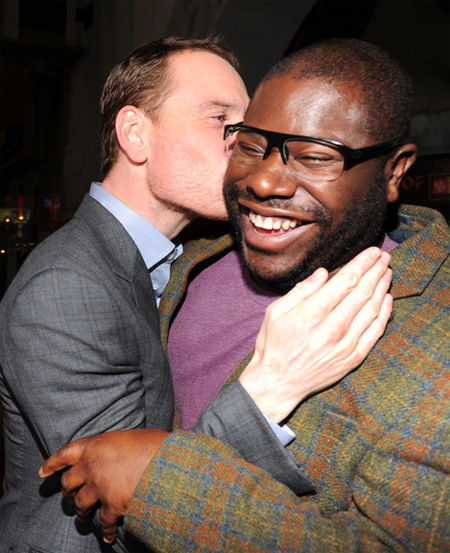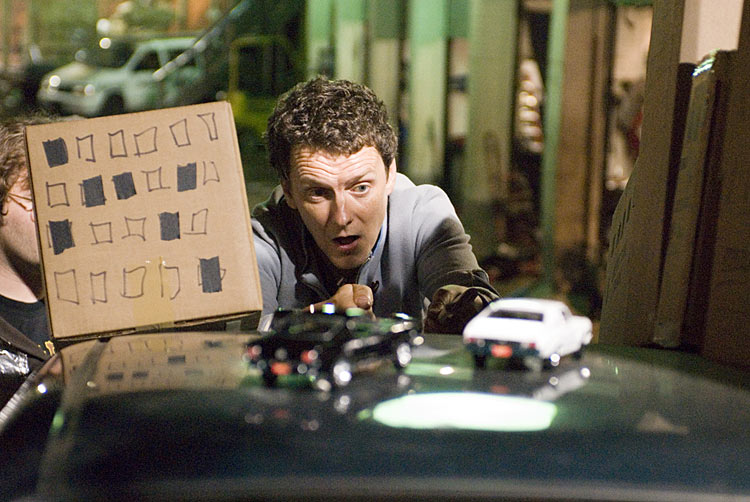 Steve McQueen didn't make the list but Fassy still loves him (as do many of our contributors)Amir here, to bring you the first edition of Team Top Ten, a communal list by all of Film Experience’s contributors that will sit in for our regular Tuesday Top Ten list once a month. For our first episode, we’ve decided to rank the best new directors of the 21st century. These are all directors who have made their first film after 2000. (Short films, TV and theatre work didn’t render anyone ineligible. Only feature length fiction and documentary films were considered.)
Steve McQueen didn't make the list but Fassy still loves him (as do many of our contributors)Amir here, to bring you the first edition of Team Top Ten, a communal list by all of Film Experience’s contributors that will sit in for our regular Tuesday Top Ten list once a month. For our first episode, we’ve decided to rank the best new directors of the 21st century. These are all directors who have made their first film after 2000. (Short films, TV and theatre work didn’t render anyone ineligible. Only feature length fiction and documentary films were considered.)
I had a blast compiling the 18 lists of our contributors to arrive at the final ten because their submissions were incredibly eclectic and surprising. I’d made a bet with myself that Steve McQueen (Hunger, Shame) would top the list, and lo and behold, he failed to make the cut altogether, though by a very fine margin. Korean director Bong Joon Ho was also left off, despite showing up on more than a handful of lists. Jason Reitman, Joshua Marston, Rian Johnson and David Gordon Green all came very close too but this was a tightly contested race, evidenced by the three-way tie for our tenth spot. Overall, 71 directors got at least one vote. We travelled all the way from Japan to Portugal, from Greece to Mexico, via documentaries, comedies and superhero films. We loved stories about Muslim families, gay romances, World War II and the beautifully painted worlds of Sylvain Chomet. What we didn't like very much turned out to be actors-turned-directors, as current Oscar champ Ben Affleck got only a single vote, and George Clooney and Tommy Lee Jones failed to manage even that.
In the end, these are the twelve men and women Team Experience considers the best (thus far) of the 21st century crop:

=10. Michel Gondry
Human Nature, Eternal Sunshine, The Sciene of Sleep, Block Party, Be Kind Rewind, etcetera
Gondry's films are shaggy fantasies powered by a boundless imagination. They're more than a little goofy, speaking quirky as if it were a language, and they have an endearing handmade quality, with their maker's fingerprints visible around the rough edges. Bent as they are toward romance and optimism, Gondry's miniature worlds provide a little solace from reality.
- Andreas Stoehr
11 more directors after the jump

=10. Andrea Arnold
Wasp, Red Road, Fish Tank, Wuthering Heights
It's tempting to sum Andrea Arnold up by reducing her women to the sum of their mistakes - cuz boy, do her women make some bad decisions - but the films themselves resist that simplification at every turn. From the get-go she's been dedicated to rendering "difficult" women with an almost journalistic flatness - there's nothing in the way of the usual sorts of judgement, not for these women or her men it should be noted; can you think of a film that's sexualized its sexual predator as much as Fish Tank did Michael Fassbender? Arnold never looks for the easy way out - she's much more interested in the fog on the moors.
- Jason Adams

=10. Joachim Trier
Reprise, Oslo August 31st
Joaquim Trier has, in a remarkably short time, established himself as a filmmaker who I think has the ability and the considerable talents to become the next great European auteur. In Reprise, he lends a frenzied, impassioned wholly unique style to the story of two friends looking to make it as writers. And with Oslo, August 31st, his keen perception and remarkable empathy for the lead character makes the film as frank and honest about the subject of depression as any I've ever seen. Two pictures in, and it's enough to know we've got something special on our hands. I can't wait to watch him grow.
- Beau McCoy

9. Sarah Polley
Away From Her, Take This Waltz, Stories We Tell
She makes movies that feel traditional and familiar but also inventive, and she fills a gap in filmmaker voices we didn't even know existed. She went from artful, chilly restraint in Away From Her to florid, high emotions in Take This Waltz to playful historical excavation in Stories We Tell-- an incredible amount of range for her first three films, and a strong sign that she's only going to get better and more fascinating going forward.
- Katey Rich

8. Lucrecia Martel
La Ciénaga (The Swamp), The Holy Girl, The Headless Woman
Lucrecia Martel's films are like conduits to sensuous experience. Everything is close to the skin; all is felt. Her cinema comes direct with an in-built arousal of near-fragrant, elusive human interaction – whether you are of her world or distant from it. She stirs in us an innate response. The visual-aural textures disorient our vision and distort our hearing; they prod and grasp us deep down, somewhere between the heart and the gut. The hothouse poison of La ciénaga, the clammy resistance of The Holy Girl and the woozy torpidity of The Headless Woman all draw us into an orbit of social flux and personal despair. Her films slip us into and out of uncertain intoxication.
- Craig Bloomfield

7. Cristian Mungiu
4 Months 3 Weeks and 2 Days, Beyond the Hills
I have to fess up that I didn't vote for Mungiu in isolation, but as part of a foursome I dubbed 'Romanians I Have Known and Loved' that also included his countrymen Cristi Puiu, Corneliu Porumboiu, and Radu Muntean; I did this because I know Nathaniel loves ties on lists, and I try to gratify him wherever possible. But even among such distinguished company (or any company, really), Mungiu's 4 Months, 3 Weeks, and 2 Days stands out as an especially rigorous, incisive, and perfectly shaped vision. Neither so austere as to lose the breath and flesh of life, nor so restricted to its characters' POVs as to limit the scope of its historical vision, nor so self-aggrandizing in technique as to promote Mungiu over the story he is telling, 4 Months evokes in nightmarish tandem, but also at human scale, both a brutally no-win dramatic episode and an asphyxiating political regime. It's pretty unbeatable as a portrait of how iron-fisted, paranoid ideologies make themselves felt within day-to-day experience. I don't think Mungiu's Beyond the Hills attains nearly the same economy or insight, though its best scenes evoke temperament, politics, and tough environments with impressive force. I haven't seen Mungiu's other films thus far, but there's no way I'd miss anything he does from here onward.
- Nick Davis

6. John Cameron Mitchell
Hedwig and the Angry Inch, Shortbus, Rabbit Hole
There are worse fates for an artist than being forever associated with one creation... if that one creation is as indelible, flexible and fascinating as "Hedwig", that is. Hedwig's transition from slip of a German girlie boy to ex-pat army wife was infamously botched (hence, the angry inch) but Hedwig had no such misshaps while leaping from the spontaneous excitement of the stage to the preserved creativity of the cinema. When I think of Hedwig (the film) I always think of "Wig in a Box" and John Cameron Mitchell's glittery ingenuity as the humble trailer "opens" up, transforming itself into a stage. His next two films -- quite different in tone but no less concerned with personal reinvention and artistic expression -- proved that Mitchell was no one-trick flash in the pan but a world class magician.
-Nathaniel R.

5. Charlie Kaufman
Synecdoche New York
The Night of the Hunter. Badlands. Eraserhead. Citizen Kane. Synecdoche, New York. Directorial debuts rarely amount to anything close to a masterpiece. But a handful of artists have managed to create transcendent cinema from their first time in the director's chair. Charlie Kaufman is probably better known as the writer of Eternal Sunshine, Being John Malkovich, and Adaptation. But it was with Synecdoche, New York, his first attempt at direction, that he reached some kind of unthinkable intellectual and experiential apex. The film is certainly demanding, but it is also breathtaking in its ability to meld compassion, intellect, and heartbreak into a tender series of variations on the theme of death. Without much visual flourish, Kaufman elevates cinema to its highest place among the greatest works of art. Sometimes, one film is all it takes.
- Matt Zurcher

4. Asghar Farhadi
Dancing in the Dust, Beautiful City, Fireworks Wednesday, About Elly, A Separation
I have a confession to make: Of Farhadi's five films as a Director, I have only seen one. That one, A Separation, is a flat-out, no-holds-barred, exceeds-sky-high-expectations masterpiece. So much so, that even if none of his previous films were any good (and I hear that they are all, in fact, quite good), I probably still would have given him my #1 spot. There may be other filmmakers on this list whose next films I anticipate more eagerly, but there isn't one whose work I respect more. They have the potential for greatness. Farhadi has already achieved it.
- Daniel Bayer

3. Apichatpong Weerasethakul
Blissfully Yours, Tropical Malady, Uncle Boonmee Who Can Recall His Past Lives, etcetera
Thailand’s best-known cinematic son, Weerasethakul - “Joe” to his Anglophone fans - is a master of creating feelings through otherworldly imagery and sound: everything from red-eyed monkey ghosts to sterile hospitals to languid riverside sexual assignations is filtered through his camera with an impressionistic, dreamy detachment like nothing else in contemporary cinema.
- Tim Brayton

2. Joe Wright
Pride & Prejudice, Atonement, The Soloist, Anna Karenina, Hanna
Is it okay to have ranked Joe Wright so high while completely discounting The Soloist? It is if you take into account the four achievements he bookended around that 2009 non-event. With a steadily-more-ambitious series of films, Wright reveled in Jane Austen, showboated in Atonement, and took real chances with Anna Karenina and especially Hanna, his best and least typical film. The best thing about him is the sense that, despite the laurels for his first two features, he's still growing.
- Joe Reid

1. Kenneth Lonergan
You Can Count On Me, Margaret
You Can Count On Me, Kenneth Lonergan's intimate marvel of a debut film, came as the millennium kicked off, and, despite its piquant, tragic undertones, still glows with an innocent warmth. That's almost entirely due to the long shadows cast by the tortured process that his sophomore effort Margaret took to the screen, potent and dense with human politics post-9/11. That Lonergan's complex yet seemingly effortless comprehension of the timbres of youth and family still towers through the years between filming and release is a testament to his immense, understated talent, and to his own stubborn ideals.
- David Upton

Let us know what you think of the list. Who do you think is missing? Share your top tens in the comments.